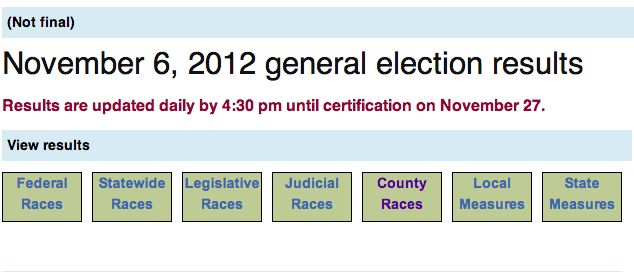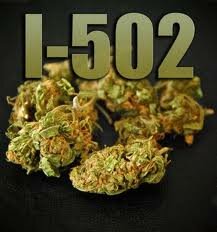
UPDATE (11/9/12: 3:45 p.m.): In the governor’s race, Jay Inslee (D) has kept his lead of about 50,000 votes over Rob McKenna (R) and barring an undiscovered county, it looks likely that Inslee wins. For Secretary of State, Kim Wyman (R) is squeaking ahead of Kathleen Drew (D), and at Treasurer, Troy Kelley (D) is also widening his lead over James Watkins (R). I-2140 for charter schools looks on the way to passing statewide–it’s provided one of the rare occasions for agreement between King and Garfield counties, which are both rejecting it. (The map of 1240 is very interesting, policy wonks.) King County has more than 200,000 ballots still to go; as of this afternoon, the state estimates 580,000 total ballots statewide are still to be counted.
UPDATE (11/8/12: 11:40 a.m.): In the Attorney General race, Reagan Dunn (R) has conceded to Bob Ferguson (D). For Secretary of State, Kim Wyman (R) and Kathleen Drew (D) are very close, with about 25,000 ballots difference. In the other state executive races, Democrats lead. Maintaining leads elsewhere: Suzan Delbene (D) over John Koster (R) for U.S. House of Representatives, District 1; and charter school initiative I-1240 and same-sex marriage R-74. Almost 2.2 million ballots have been counted, with 744,000 still to go, plus any ballots still “in the mail.”
UPDATE (11/7/12: 6:36 p.m.): In terms of whole percentage points, nothing seems to have changed!
UPDATE (11/7/12: 4:00 p.m.): King County Elections has announced they’re delayed today’s results until 6:30 p.m., due to volume and just plain screwiness with these crazy machines.
One of the “Wait, what?” consequences of how mail-in voting is set up is that King County Elections plans to post results until after Thanksgiving, finally certifying the election on November 27–unless, you know, there’s a delay. The rule is that ballots need only be postmarked on election day–you simply can’t hurry some people–so there can be three or four days of high anxiety in very close races.
As of last night, King County Elections had counted about 556,000 ballots out of a possible 1.17 million, so there’s still a ways to go. They are forecasting an 87-percent voting rate, or around 1 million ballots total. Another update comes at 4:30 p.m. today. On the state level, with 3.9 million total registered voters, more than 1.9 million ballots have been counted, with more than 600,000 on hand and uncounted still. The next Washington State Elections update is at 4:00 p.m. today.
 One local result that you can count on is the passage of Seattle’s $290-million Alaskan Way seawall levy (at 77 percent in favor). John Urquhart is also way out in front in the race for King County Sheriff. For U.S. Senate, Maria Cantwell (D) is, in the parlance of the day, squashing Michael Baumgartner’s hopes like a bug. Anti-tax Initiative 1185, which would require two-thirds approval for new or increased taxes, is very near two-thirds approval. (It would be ironic should it not reach that mark, and still restrict all tax legislation following it in an essentially arbitrary manner–or so I opine.)
One local result that you can count on is the passage of Seattle’s $290-million Alaskan Way seawall levy (at 77 percent in favor). John Urquhart is also way out in front in the race for King County Sheriff. For U.S. Senate, Maria Cantwell (D) is, in the parlance of the day, squashing Michael Baumgartner’s hopes like a bug. Anti-tax Initiative 1185, which would require two-thirds approval for new or increased taxes, is very near two-thirds approval. (It would be ironic should it not reach that mark, and still restrict all tax legislation following it in an essentially arbitrary manner–or so I opine.)
But much is too close to be certain of, as yet. That includes the races for governor (Inslee leads McKenna by just 50,000 votes) and secretary of state (Wyman over Drew by 14,000), 1240 on charter schools (Yes by about 44,000), and R74 for same-sex marriage (Yes by around 68,000).
With more substantial differences are the race for Attorney General (Ferguson is up over Dunn by about six percent), 502 to legalize marijuana (55 percent Yes to 44 percent No), and Engrossed Senate Joint Resolution No. 8221, which allows the state to pretend that it has much more revenue to use as debt collateral than it really does to increase the amount of money it’s allowed to borrow (63 percent Yes to 37 percent No). You might say that 8221 is the corollary to 1185: Can’t raise revenue? Take on more debt.


